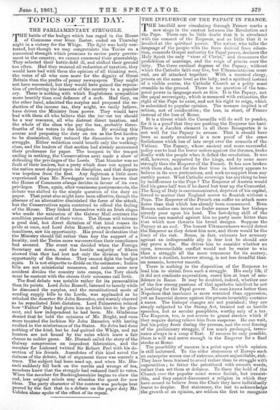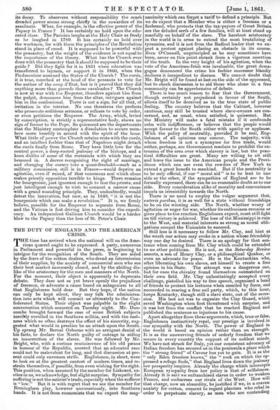Tait; INFLUENCE OF THE PAPACY IN FRANCE. T HE handbill now
circulating through France marks a new stage in the contest between the Revolution and the Pope. There can be little doubt that it is circulated with the consent of the Emperor, and as little that it is levelled at the spiritual power. The writer, who talks the language of the people with the force derived from educa- tion, demands Gospel authority for Papal power, declares the Holy Spirit the only "vicar of Christ," and denounces the prohibition of marriage, and the reign of priests over the laity. The three cardinal dogmas of the Papacy, without which the Catholic faith may live, but Ultramontauism must end, are all attacked together. With a married clergy, priests on the same level as the laity, and a spiritual instead of a visible centre, the Catholic Church as a polity must crumble to the ground. There is no question of the tem- poral power in language such as this. It is the Papacy, not the papal sovereignty, which is menaced with extinction, the right of the Pope to exist, and not his right to reign, which is submitted to popular opinion. The menace implied is of schism, not of confiscation; the loss, in short, of France instead of the loss of Rome.
It is a threat which the Camarillo. will do well to ponder, for it is a proof that they are pushing the Emperor too hard. There is a Jacobin element in all these Bonapartes it is not well for the Papacy to arouse. That it should have been so nearly awakened is a new proof of the crass foolishness which has of late crept over the councils of the Vatican. The Papacy, whose ancient and more successful policy was to lead the lower orders against the thrones, broke finally with the people when it defied the revolution. It was still, however, supported by the kings, and by none more strongly than the Emperor of the French. It has now broken with them also, and for the first time in history appears to believe in its own pretensions, and seek no support from any earthly power. What Catholic sovereign has anything to lose by indifference to the Pope ? The Emperor of Austria would find his game half won if he dared but tear up the Concordat. The King of Italy is excommunicated, deprived of his capital, forced to mutter that England seems to flourish without a Pope. The Emperor of the French can suffer no attack more fierce than that which has already been commenced. Even Roman malice can invent no fouler.names than her bishops already pour upon his head. The fast-dying skill of the Vatican can marshal against him no party more bitter than that which now thwarts his broad designs. Suppose the Papacy at an end. The honest Ultramontanes would detest the Emperor as they detest him now, and there would be the limit of the risk. Rome, in fact, exhausts her armoury against an indispensable ally in fear lest he should one day prove a foe. She drives him to consider whether an open, irreconcilable conflict would not be easier to win than a struggle all the more venomous for its secrecy, whether a duellist, however strong, is not less dreadful than an assassin, however smooth.
There is . nothing in the disposition of the Emperor to lead him to -shrink from such a struggle. His early life, if it did not eradicate superstition, cured him at least of con- fidence in Rome. It may be doubted, indeed, whether one of the few strong passions of that apathetic intellect be not a loathing for the Papal power. No man knows better than Napoleon that insolence is more resented than oppression, yet an Imperial decree against the priests invariably contains a sneer. The bishops' charges are not punished ; they are simply subjected to the Stamp Act, treated not as hostile speeches, but as secular pamphlets, worthy only of a tax. The Emperor, too, is not averse to grand strokes which if they require daring relieve him from suspense. He can wait, but his policy heats during the process, and the cool fencing of the preliminary struggle, if too much prolonged, termi- nates always in a coup d'Etat.. If success be only possible, there is will and nerve enough in the Emperor for a final stroke at Rome.
The possibility of success is a point upon which opinion. is still unformed. To the older statesmen of Europe such an enterprise seems one of extreme, almost unjustifiable, risk. They have been trained to avoid rather than to struggle with superstition ; to fetter the priesthood with smooth words, rather than set them at defiance. To them the hold of the Church over the popular mind seems foolish, but irresist- ible, and they cannot disconnect a religion in which they have ceased to believe from the Chair they have individually learnt to despise. But statesmen, the last to acknowledge the growth of an opinion, are seldom the first to recognize its decay. To observers without responsibility the much dreaded power seems strong chiefly in the cowardice of its assailants. What, for example, is the effective power of the Papacy in France ? It has certainly no hold upon the edu- cated class. The Parisian laughs at the Holy Chair as freely as he laughed in 1789. It has certainly no hold over the workmen, for with them the principles of the Revolution stand in place of creed. It is supposed to be powerful with, the peasantry, but the weight of the evidence is not equal to the importance of the theory. What has the Church ever done with the peasantry that it should be supposed to be their guide ? Did they fight for it in 1831 when education was transferred to laymen, or support it in 1860, when the Piedmontese annexed the States of the Church ? The cures, it is true, marched at the head of the peasants to vote for the author of the coup d'Etat, but is it proved that they did anything more than precede those cavalcades ? The Church is now at war with the Emperor, thunders against him from the pulpit, denounces him from the altar, intrigues against him in the confessional. There is not a sign, for all that, of irritation in the interior. No one threatens the prefects who prosecute seditious sermons, or refuses to vote by order, or even petitions the Emperor. The Army, which, levied by conscription, is strictly a representative body, shows no sign of favour to the Pope. So quiescent are the departments that the Ministry contemplate a dissolution to secure mem- bers more heartily in accord with the spirit of the hour. What little of power the Church retains rests with the cures, and an intellect feebler than that of Napoleon might detach the cures finally from Rome. They have little love for the central power, a deep-rooted jealousy of the bishops, and a keen dislike of some of the restraints with which they are hemmed in. A decree recognizing the right of marriage, and changing the curacy into a quasi-freehold—such as a military commission still is in France—would deprive an agitation, even if raised, of that venomous zeal which alone makes priestly opposition terrible to kings. There remains the bourgeoisie, just ignorant enough to fear the priests, and just intelligent enough to wish to connect a narrow cause with a grand sounding principle. They, undoubtedly, would detest the innovation, but now, as in 1848, " it is not the bourgeoisie which can make a revolution." It is, we firmly believe, possible for the Emperor to separate from Rome, and the Vatican is fast driving him to consider the expedi- ency. An independent Gallican Church would be a harder blow to the Papacy than the loss of St. Peter's Chair.































 Previous page
Previous page